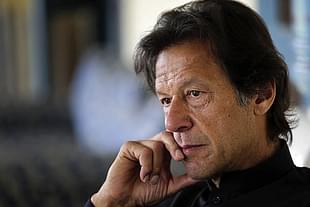Insta
Pakistan PM Imran Khan’s ‘Islamic Welfare State’ Promise In Tatters As He Signs Up For Tough IMF Bailout Package
Swarajya Staff
Jul 07, 2019, 12:57 PM | Updated 12:57 PM IST
Save & read from anywhere!
Bookmark stories for easy access on any device or the Swarajya app.


The International Monetary Fund (IMF) has approved a three-year $6 billion bailout package for cash-strapped Pakistan with tough conditions to address its balance of payment crisis and help the Islamic republic's ailing economy to return to a sustainable growth path.
The IMF’s executive board approved the bailout package after Pakistan Prime Minister Imran Khan’s government announced a series of tough reform measures to secure the funding and address the economic crisis.
The $6 billion financial aid includes an immediate disbursement of $1 billion to help Pakistan address its balance of payment crisis. The fund will review Pakistan's performance quarterly over 39 months, before releasing additional aid in future phases.
IMF Executive Board approved today a three-year US$6 billion loan to support #Pakistanâs economic plan, which aims to return sustainable growth to the countryâs economy and improve the standards of living. pic.twitter.com/HCAMr1KWfK
— Gerry Rice (@IMFSpokesperson) July 3, 2019
“The remaining amount will be phased over the duration of the programme, subject to four quarterly reviews and four semi-annual reviews," the IMF said in a statement, indicating that Pakistan needs to take tough austerity measures in the coming three years.
The IMF Executive Board "approved a 39-month extended arrangement" under the Extended Fund Facility (EFF) for Pakistan for $6 billion to support its economic reform programme, it said.
"The EFF-supported programme will help Pakistan to reduce economic vulnerabilities and generate sustainable and balanced growth focusing on: a decisive fiscal consolidation to reduce public debt and build resilience while expanding social spending," the statement said.
It will also support a flexible, market-determined exchange rate to restore competitiveness and rebuild official reserves; to eliminate quasi-fiscal losses in the energy sector; and to strengthen institutions and enhance transparency, the statement added.
Dr Abdul Hafeez Shaikh, Advisor to Pakistan prime minister on Finance, in Islamabad said the IMF's move is a testimony of the government's resolve to ensure financial discipline and sound economic management in the country.
IMF Board approved a $6 billion Extended Fund Facility (EFF) for Pakistan to support our economic reform program. Our program supports broad based growth by reducing imbalances in the economy. Social spending has been strengthened to completely protect vulnerable segments.
— Dr. Abdul Hafeez Shaikh (@a_hafeezshaikh) July 3, 2019
The bailout would mean that PM Imran Khan has to jettison his election promise of building an Islamic welfare state to stabilise the economy, which faces a balance of payments deficit caused by high level imports, lacklustre export growth and a galloping fiscal deficit.
Among the structural reforms Pakistan has undertaken to carry out in return for the IMF support include improving tax collection by one-third, raising tax rates, cutting government spending and increasing gas and electricity prices. The steps are expected to decelerate the already abysmal growth rate with the spectre of inflation spike looming large. The middle-class voters, who form the core of PM Khan’s political base, are likely to bear the brunt of these moves.
As per IMF estimates, Pakistan’s economic growth is expected to further dwindle to 2.4 per cent in the coming financial year.
Pakistan last month reached an agreement with the IMF on the bailout package after marathon talks. Under criticism for failing to improve the economy, PM Khan changed the entire economic team including the finance minister, chief of State Bank of Pakistan (SBP) and head of Federal Bureau of Revenue (FBR).
The latest deal is the 22nd bailout package since Pakistan became a member of the IMF in 1950.
PM Khan made frenetic efforts to avoid going to IMF and secured more than $9 billion in financial aid packages from friendly countries like Saudi Arabia, United Arab Emirates and China. However, mounting economic headwinds forced the Pakistan government to turn to the IMF. Last month, Pakistan secured a bailout package of $3 billion from oil-rich Qatar.
China gave $4.6 billion in shape of deposits and commercial loans and Saudi Arabia provided $3 billion cash deposit and $3.2 billion oil facility on deferred payments. The United Arab Emirates also provided a $2 billion cash deposit.
With foreign exchange reserves shrinking to just $7.3 billion, less than the equivalent of two months' worth of imports, and the budget deficit set to top seven per cent of gross domestic product this year, Pakistan faces tough economic medicine to tackle problems that have been years in the making.
(With inputs from PTI)





